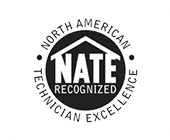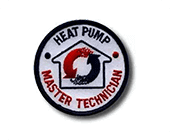If you’re a homeowner, you’ve probably wondered: “how long will my furnace last?” After all, your furnace is essential for keeping your living space comfortable during the colder months.
Knowing the answer to the question, “how long does a furnace last?”—and the factors that influence it—can help you plan for routine maintenance, repairs, or even a furnace replacement when the time comes.
In this guide, we’ll discuss how long a furnace lasts, what affects its lifespan, signs that it’s time for a replacement, and various tips for extending its life.
How Long Does a Furnace Last? – A Basic Guide
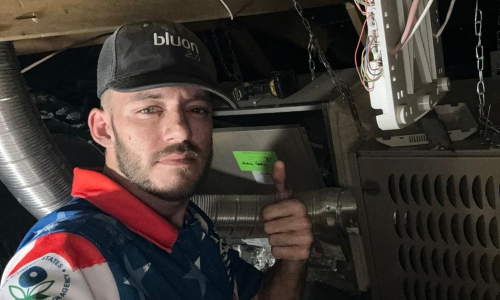
On average, a well-maintained furnace lasts 15 to 20 years. However, some units can last even longer with proper maintenance and care, while others may fail sooner due to neglect or poor installation.
Factors such as the type of furnace, frequency of use, maintenance habits, and local climate all play a role in determining furnace life expectancy.
Understanding these elements can help you get the most out of your heating system and avoid unexpected breakdowns.
What Affects the Lifespan of a Furnace?
Now that you know the answer to the question, “how long does a furnace last?”, let’s look at the various factors that affect the lifespan of these units. Several factors influence how long yours will last:
1. Furnace Quality and Professional Installation
- A high-quality furnace from a reputable brand typically lasts longer than a lower-quality model.
- Proper installation is crucial—if a furnace is too large or too small for your home, it can cause excessive wear and tear.
- Working with a professional HVAC company like Autumn Air ensures your furnace is installed correctly for maximum efficiency.
2. Regular Maintenance and Repairs
- Annual furnace inspections and tune-ups help identify minor issues before they turn into costly repairs.
- Dirty air filters, clogged ducts, and worn-out components make your furnace work harder and reduce its lifespan.
- Scheduling seasonal maintenance keeps your system running efficiently and extends its life.
3. Frequency of Use and Local Climate
- If you live in a colder climate, your furnace will run more frequently, leading to faster wear and tear.
- Thermostat settings also matter—keeping your home excessively warm in the winter can put extra strain on the system.
- Proper home insulation helps reduce the workload on your furnace.
4. Ductwork and Airflow Efficiency
- Leaky or poorly designed ductwork makes your furnace work harder to distribute heat evenly.
- Blocked vents and dirty ducts can restrict airflow, causing overheating and premature system failure.
- Keeping ductwork clean and properly sealed improves energy efficiency and prolongs your furnace’s lifespan.
5. Fuel Type and Energy Efficiency
Different furnaces have different lifespans:
- Gas furnaces generally last 15 (or more) years with proper care.
- Electric furnaces tend to last 20 to 30 years due to fewer moving parts and less wear.
- Furnaces with higher AFUE (Annual Fuel Utilization Efficiency) ratings are designed for better performance and longevity.
Signs It’s Time to Replace Your Furnace
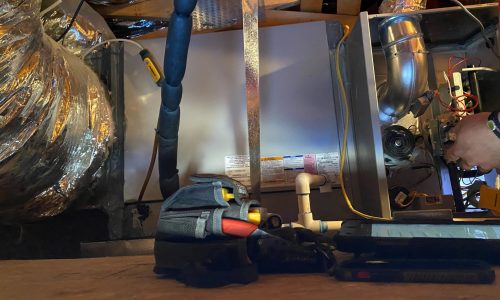
Even with the best care, every furnace will eventually need to be replaced. If you notice these telltale warning signs, it might be time to consider an upgrade:
- Frequent Repairs – If your furnace needs constant servicing for issues like a malfunctioning thermostat, a cracked heat exchanger, or a faulty blower motor, it may be more cost-effective to consider upgrading to a new furnace.
- Rising Energy Bills – As your furnace ages, it loses efficiency, requiring more energy to produce the same heat level. If your utility bills have been increasing despite normal usage, your system is likely working harder than it should, wasting energy and increasing costs.
- Uneven Heating – Noticing temperature differences between rooms? If certain areas of your home feel warmer than others, your furnace may be having trouble distributing heat evenly. This could be caused by worn-out components, aging ductwork, or a system that can no longer meet your heating needs.
- Strange Noises or Smells – If you hear banging, rattling, or squealing noises, it could mean parts are loose or wearing out. Additionally, strange odors—like a burning smell—can indicate overheating, dust buildup, or even potential safety concerns like a cracked heat exchanger, which can release dangerous carbon monoxide into your home.
- Difficulty Maintaining Temperature – If your furnace struggles to maintain the temperature set on your thermostat, it may be losing efficiency. Constant cycling (turning on and off frequently) or running continuously without effectively warming your home are key indicators that your system is nearing the end of its lifespan.
- Furnace Blowing Cold Air – A furnace that starts blowing cold air instead of warm air could signal serious mechanical failures, such as a malfunctioning heat exchanger, ignition issues, or a failing blower motor. If the problem persists despite repairs, replacement is often the best option.
If your old furnace is 15+ years old and showing these signs, it’s time to consider a replacement. Upgrading to a new, high-efficiency furnace model can improve comfort, lower energy bills, and reduce the risk of unexpected breakdowns.
How to Extend Your Furnace’s Lifespan
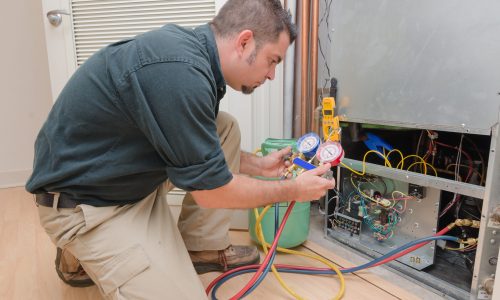
Want to keep your furnace running efficiently for as long as possible? Follow these expert tips:
- Schedule Annual Maintenance – A professional HVAC technician can perform a comprehensive tune-up to ensure your furnace operates safely and efficiently.
- Change Air Filters Frequently – Installing a fresh filter every one to three months can help maintain airflow and improve air quality, keeping your furnace running efficiently.
- Seal and Insulate Your Home – Quality insulation reduces heat loss, helping your HVAC system work less.
- Upgrade to a Smart Thermostat – Smart thermostats minimize energy usage, reducing strain on your system.
- Keep Vents and Ducts Clean – Unobstructed airflow prevents overheating and mechanical stress.
By following these steps, you can maximize the lifespan of your furnace unit and improve its efficiency.
Trust Autumn Air for Expert Furnace Care
At Autumn Air, we understand how important a reliable furnace is for your home. With years of experience, we provide top-quality furnace maintenance, repairs, and replacements to keep your living space comfortable all year round.
If your furnace is 15 years or older or notices signs of decline, don’t wait until it fails. Contact Autumn Air today for a professional furnace evaluation and discover the best heating solutions for your home!
Call us now or schedule your furnace service online!





